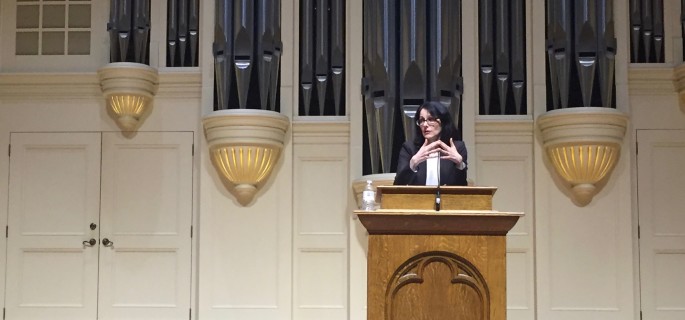‘Changing the Conversation’ lecture takes cyber harassment from the web to reality

Media critic and blogger Anita Sarkeesian had been facing serious harassment and threats as part of the ‘Gamergate controversy’ since she launched a Kickstarter campaign to create a series of videos addressing sexism in video games, but this threat was different. She was set to give a talk at Utah State University, when a anonymous call to the dean’s office forced her to consider otherwise.
“If you let Anita Sarkeesian speak at your school, there will be a school shooting worse than Columbine and Cologne combined.”
Under Utah state law, the university could not ban all firearms from the venue. Sarkeesian cancelled the event for security reasons.
Using real stories like Sarkeesian’s, University of Maryland Professor of Law Danielle Citron took the Elon community through the dangers of cyber stalking, how the law can assist in prosecution of offenders and how companies can step in when the necessary laws are not in place in her lecture on March 10 at Elon University. Citron was the second lecturer in this year’s Lauren Dunne Astley Memorial Lecture entitled “Changing the Conversation: Tackling the New Frontier of Online Harassment.”
Eight years ago the suggestion that law should intervene in online abuse was unheard of, Citron said, however the United States has made great strides within that time period.
“Instead of being no big deal, triviality, we really I think have come to understand cyber harassment as devastating to someone physically and economically and socially,” she said.
Citron used the criminal law definition to define cyber harassment as, “a repeated targeting of a specific individual with a course of conduct that is persistent and repeatedly addressing someone in ways that are intended to cause severe emotional distress, and causes severe emotional distress.”
“The truth of the matter is, it’s really the everyday person that gets targeted,” Citron said.
While both men and women experience online harassment, women, especially young women between 18 and 24-years-old are most often the victims. According to the Pew Research Center, 26 percent of young women have been stalked online and 25 percent have been targets of online sexual harassment. Exploitation through nude imagery and sexual videos are common privacy violations victims experience; cyber stalking often finds its strength through sexually demeaning acts.
Combatting cyber harassment lies in the hands of companies and the law.
“In 50 percent of states, laws on the book need significant reform,” Citron said about harassment and stalking laws.
In a number of states, the harassing material must be sent directly to the victim to be in violation of the law. This allows perpetrators to post on social media websites like Twitter or send images to an employer without violating these laws. However within the past 18 months, two states criminalized non-consensual postings of nude photos online, so Citron is optimistic about the future of encompassing cyber harassment in harassment and stalking laws.
“Cyber stalking is the perfect storm of speech that either enjoys no protection, or less significant protection,” Citron said. “What kind of counter speech is there to a rape threat? Don’t rape me?”
While companies are not first amendment actors, Citron referenced several companies making strides to support victims of cyber harassment such as Google and Bing de-indexing nude photographs posted without the subject’s consent that show up when their name is searched, or Facebook and Twitter amending their community guidelines.
Anonymity is ” a double-edged sword,” Citron said.
“When we’re anonymous, we feel anonymous, we’re willing to do insane things that we would never do.”
Promoting cyber harassment awareness and having proper laws in place to prohibit anonymous users from abusing their anonymous status are just a few of the steps our society needs to take to promote safe spaces online for all users.
Lauren Dunne Astley was an 18-year-old student from Massachusetts excited to join Elon’s community as part of the class of 2015, when she was killed July 3, 2011 by her ex-boyfriend.The Lauren Dunne Astley Memorial Lecture is funded by the Lauren Dunne Astley Memorial Fund her parents created to honor their daughter post-mortem. The lecture serves to educate and inform the Elon University community about mutually effective relationships, emphasizing preventing boys’ and men’s violence against girls and women and other boys and men. The program is directed by Elon’s Women’s, Gender, and Sexualities Studies program, in partnership with other university offices and programs.
Lauren’s father, Malcolm Astley, was in attendance.













‘Anita Sarkeesian had been facing serious harassment and threats as part of the ‘Gamergate controversy’
No she really hasn’t. These people are professional victims who fake their own harassment to get gullible fools to donate money.
If all these stories about GamerGate harassment actually had anything to do with real life. How come 0 GamerGate supporters have been arrested, and so far we have only succeeded in driving 0 women out of the gaming industry?